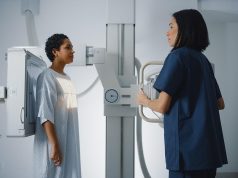Longer duration of exposure, highest cumulative exposure inversely linked to risk after age 50 years
TUESDAY, Feb. 2, 2021 (HealthDay News) — Long-term occupational exposure to ultraviolet B radiation (UVR) is inversely associated with breast cancer risk, according to a study published online Feb. 1 in Occupational & Environmental Medicine.
Julie Elbaek Pedersen, from the Danish Cancer Society in Copenhagen, and colleagues examined the correlation between occupational UVR exposure and female breast cancer. A total of 38,375 women younger than 70 years were identified with primary breast cancer; each case was matched with five female controls born in the same year and free from breast cancer at the time of diagnosis of the index case. A full employment history was retrieved and a job exposure matrix was used to assess occupational UVR exposure.
The researchers observed no overall association between occupational UVR exposure and breast cancer. Longer duration of UVR exposure (≥20 years) and highest cumulative exposure were inversely associated with risk after the age of 50 years (odds ratios, 0.83 and 0.89, respectively). No notable risk differences were observed by estrogen receptor status.
“This large-scale, population-based, case-control study indicates that occupational UVR exposure may have a slightly protective effect on the risk of breast cancer after the age of 50, independent of hormonal receptor status,” the authors write. “This association needs to be confirmed in future studies with more refined analyses, including important confounders.”
Copyright © 2020 HealthDay. All rights reserved.








